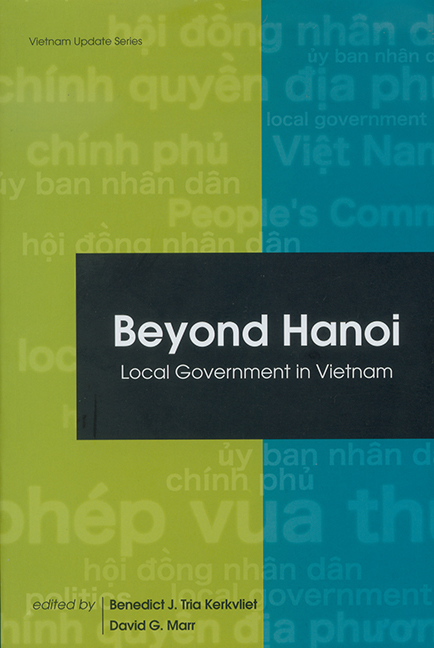Book contents
- Frontmatter
- Contents
- Preface
- Abbreviations
- 1 Surveying Local Government and Authority in Contemporary Vietnam
- 2 A Brief History of Local Government in Vietnam
- 3 Village Government in Pre-colonial and Colonial Vietnam
- 4 Caught in the Middle: Local Cadres in Hai Duong Province
- 5 Winter Crop and Spring Festival: The Contestations of Local Government in a Red River Delta Commune
- 6 Local Politics and Democracy in a Muong Ethnic Community
- 7 Local Government in the Exercise of State Power: the Politics of Land Allocation in Black Thai Villages
- 8 Urban Government: Ward-level Administration in Hanoi
- 9 The Facilitators of Rural Transformation and Development: The Role of Agricultural Extension Officers in Two Districts of Long An Province
- 10 Ho Chi Minh City's Post-1975 Political Elite: Continuity and Change in Background and Belief
- 11 Push, Pull, and Reinforcing: The Channels of FDI Influence on Provincial Governance in Vietnam
- Glossary of Vietnamese Terms
- Index
- About the Contributors
Preface
Published online by Cambridge University Press: 21 October 2015
- Frontmatter
- Contents
- Preface
- Abbreviations
- 1 Surveying Local Government and Authority in Contemporary Vietnam
- 2 A Brief History of Local Government in Vietnam
- 3 Village Government in Pre-colonial and Colonial Vietnam
- 4 Caught in the Middle: Local Cadres in Hai Duong Province
- 5 Winter Crop and Spring Festival: The Contestations of Local Government in a Red River Delta Commune
- 6 Local Politics and Democracy in a Muong Ethnic Community
- 7 Local Government in the Exercise of State Power: the Politics of Land Allocation in Black Thai Villages
- 8 Urban Government: Ward-level Administration in Hanoi
- 9 The Facilitators of Rural Transformation and Development: The Role of Agricultural Extension Officers in Two Districts of Long An Province
- 10 Ho Chi Minh City's Post-1975 Political Elite: Continuity and Change in Background and Belief
- 11 Push, Pull, and Reinforcing: The Channels of FDI Influence on Provincial Governance in Vietnam
- Glossary of Vietnamese Terms
- Index
- About the Contributors
Summary
When the word “Vietnam” is mentioned, many people still think of a war that ended twenty-nine years ago. Yet Vietnam, the country, possesses the second largest population in Southeast Asia and ranks twelfth largest in the world. Surely it deserves to be approached on its own terms, not as a foreign memory.
A stern test of this prescription is to study governance in Vietnam. Undoubtedly, Vietnam's entire political system was profoundly influenced by war and revolution from 1945 to the late 1970s. On the other hand, those western writers who labelled Vietnam “totalitarian” had very little to go on except their own Cold War ideological predilections, extrapolations from Stalin's USSR, and Hanoi's determination to portray Ho Chi Minh and the Communist Party as infallible. Scholars who rejected the totalitarian epithet for Vietnam still found themselves severely limited as to sources that might support alternative models. Fieldwork was impossible, archives were closed, provincial newspapers inaccessible. By default, the utterances of central leaders and public intellectuals dominated writings on contemporary Vietnam. And governance — being inherently political — proved more difficult to research in practice than economic, social or cultural topics. Vietnam's research conditions have improved substantially during the past decade, with scholars able to reside in the countryside, some archival materials rendered accessible, and back sets of hundreds of local periodicals readily available at the National Library in Hanoi. Of equal importance, a new generation of Vietnamese and foreign scholars has emerged and is making its mark in PhD theses and publications. Growing up after the war, these young men and women are looking at received wisdom critically, asking fresh questions, and eagerly taking advantage of the wider range of study opportunities. are delighted that a number of promising young scholars are represented in this book.
While governance is the context for this book, it is still only feasible in Vietnam to examine certain aspects rigorously.
- Type
- Chapter
- Information
- Beyond HanoiLocal Government in Vietnam, pp. vii - ixPublisher: ISEAS–Yusof Ishak InstitutePrint publication year: 2004

